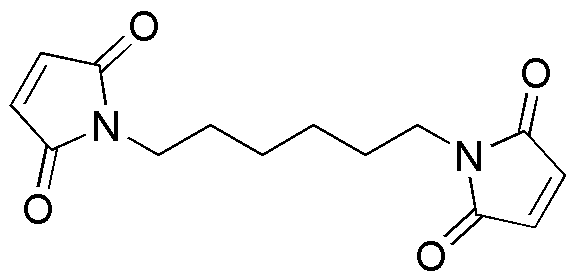1,6-Bis-maleimidohexane is widely utilized in research focused on:
- Polymer Chemistry: This compound serves as a crosslinking agent in the synthesis of thermosetting polymers, enhancing their mechanical properties and thermal stability, which is crucial for applications in automotive and aerospace industries.
- Biomedical Applications: It is used in the development of biocompatible materials for drug delivery systems, providing a controlled release of therapeutic agents, which is essential in improving patient outcomes in medical treatments.
- Adhesives and Sealants: The compound is incorporated into formulations for high-performance adhesives, offering superior bonding strength and resistance to environmental factors, making it ideal for construction and manufacturing sectors.
- Coatings: It is utilized in the production of protective coatings that enhance durability and resistance to corrosion, particularly in marine and industrial applications, ensuring longer-lasting surfaces.
- Electronics: This chemical is applied in the formulation of electronic encapsulants, providing excellent insulation and protection for sensitive components, which is vital for the reliability of electronic devices.
General Information
Properties
Safety and Regulations
Applications
1,6-Bis-maleimidohexane is widely utilized in research focused on:
- Polymer Chemistry: This compound serves as a crosslinking agent in the synthesis of thermosetting polymers, enhancing their mechanical properties and thermal stability, which is crucial for applications in automotive and aerospace industries.
- Biomedical Applications: It is used in the development of biocompatible materials for drug delivery systems, providing a controlled release of therapeutic agents, which is essential in improving patient outcomes in medical treatments.
- Adhesives and Sealants: The compound is incorporated into formulations for high-performance adhesives, offering superior bonding strength and resistance to environmental factors, making it ideal for construction and manufacturing sectors.
- Coatings: It is utilized in the production of protective coatings that enhance durability and resistance to corrosion, particularly in marine and industrial applications, ensuring longer-lasting surfaces.
- Electronics: This chemical is applied in the formulation of electronic encapsulants, providing excellent insulation and protection for sensitive components, which is vital for the reliability of electronic devices.
Documents
Safety Data Sheets (SDS)
The SDS provides comprehensive safety information on handling, storage, and disposal of the product.
Product Specification (PS)
The PS provides a comprehensive breakdown of the product’s properties, including chemical composition, physical state, purity, and storage requirements. It also details acceptable quality ranges and the product's intended applications.
Certificates of Analysis (COA)
Search for Certificates of Analysis (COA) by entering the products Lot Number. Lot and Batch Numbers can be found on a product’s label following the words ‘Lot’ or ‘Batch’.
*Catalog Number
*Lot Number
Certificates Of Origin (COO)
This COO confirms the country where the product was manufactured, and also details the materials and components used in it and whether it is derived from natural, synthetic, or other specific sources. This certificate may be required for customs, trade, and regulatory compliance.
*Catalog Number
*Lot Number
Safety Data Sheets (SDS)
The SDS provides comprehensive safety information on handling, storage, and disposal of the product.
DownloadProduct Specification (PS)
The PS provides a comprehensive breakdown of the product’s properties, including chemical composition, physical state, purity, and storage requirements. It also details acceptable quality ranges and the product's intended applications.
DownloadCertificates of Analysis (COA)
Search for Certificates of Analysis (COA) by entering the products Lot Number. Lot and Batch Numbers can be found on a product’s label following the words ‘Lot’ or ‘Batch’.
*Catalog Number
*Lot Number
Certificates Of Origin (COO)
This COO confirms the country where the product was manufactured, and also details the materials and components used in it and whether it is derived from natural, synthetic, or other specific sources. This certificate may be required for customs, trade, and regulatory compliance.


